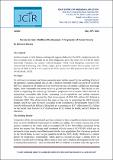| dc.contributor.author | Mwaba, Bernard | |
| dc.date.accessioned | 2023-05-31T06:55:33Z | |
| dc.date.available | 2023-05-31T06:55:33Z | |
| dc.date.issued | 2023-05-30 | |
| dc.identifier.uri | https://hdl.handle.net/20.500.14274/1795 | |
| dc.description.abstract | Zambia remains in debt distress and urgently requires debt relief. Weak fiscal discipline, excessive non-concessional borrowing, and falling copper prices caused external debt to jump from 6.7 percent of GDP in 2011 to 66.4 percent in 2019, and to over 100 percent at the end of 2022. Zambia entered into a USD 1.3 billion Extended Credit Facility (ECF) with the IMF for a duration of 38 months in order to restore its macroeconomic stability and encourage higher, more sustainable and more inclusive growth and development. This facility is also aimed at supporting the national government’s programme for economic reform focused on maintaining sustainable debt levels, increasing social expenditure and raising economic standards. Irrespective of this, poverty continues to have a significant physical and mental brunt on early-childhood development in Zambia. In totality, the country remains one of the poorest countries in the world, with an estimated 62% of her 19.6 million population living below the poverty line. | en |
| dc.description.sponsorship | EURODAD, Scottish Catholic International Aid Fund, Norwegian Church Aid-Danish Church Aid, National Democratic Institute, International Budget Partnership. | en |
| dc.publisher | Jesuit Centre for Theological Reflection | en |
| dc.rights | Attribution-ShareAlike 3.0 United States | * |
| dc.rights.uri | http://creativecommons.org/licenses/by-sa/3.0/us/ | * |
| dc.subject | Poverty | en |
| dc.subject | Early Childhood Development | en |
| dc.subject | ECD | en |
| dc.subject | IMF | en |
| dc.title | Poverty in Early-Childhood Development: A Perpetuator of Future Poverty | en |
| dc.type | Article | en |

